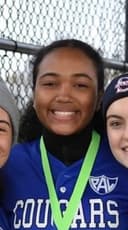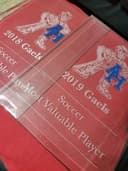Mikey Magyar '22 Recruiting Profile

Video
 2021 Spotlight
2021 Spotlight Mikey Magyar -#5 ...
Mikey Magyar -#5 ... Mikey Magyar #5 L...
Mikey Magyar #5 L... Mikey Magyar #5 L...
Mikey Magyar #5 L... Mikey Magyar #5 L...
Mikey Magyar #5 L... January 2021
January 2021 2020 Highlights
2020 Highlights Mikey Magyar #84 ...
Mikey Magyar #84 ... Mikey Magyar #84 ...
Mikey Magyar #84 ...Personal Statement
Personal Statement
Hockey has been a part of my life as long as I can remember. I started playing after going to a Tampa Bay Lightning game with my family. My brother and I were so interested in the sport that our parents encouraged us to try skating at the local rink. Growing up in Florida, playing hockey has always been a double-edged sword. While playing up north for the past couple years, whenever I get asked where I am from and I say, “Tampa,” there is always a surprised response. I attribute a great deal of who I am to the uniqueness and challenge of playing hockey in Florida. It is an unconventional place to get training and grow up playing hockey, but also an integral part of who I have become for which I am very thankful. Hockey has been there to provide me with the opportunity to make friends, compete, and have fun which I will always be forever grateful for.
While in mites, I met three of my best friends, including one that I continue to meet up with regularly during the off-season to workout and train. These friends I was able to continue to play with during my time in Squirt hockey. A personal accomplishment came when I was named captain my second year of Squirts. At such a young age it does not seem to make sense to have captains, however, the usefulness of the experience I greatly underrated. Looking back, the maturity and the patience I learned from that first time being a captain was vital to understand what type of person I would be on and off the ice: A leader that leads based on values and by example.
While playing Peewee hockey, I changed organizations to a more competitive team coached by Stan Neckar and Sami Salo, two former Lightning NHL players (one of whom won the Stanley Cup in ‘04). Having the fortune of being taught from two men who have been at the highest level was an amazing experience. These two years were probably the most influential years in developing who I am as a player. I worked with Coach Stan two to three mornings a week before school for 5 years, helping me improve my skills. The main playing style I have today was built from this training. I learned to be patient with the puck and scan the ice for options. my skating evolved to a more fluid and deliberate style, and my shot went from barely being able to control it to being able to place the puck where I wanted it. Through all this amazing coaching, our team won states the first year and the second year we won a AAA tournament.
First-year Bantam was probably the most challenging point in my hockey career. Due to family issues, my parents wanted me to play at the rink close to our home. My team was supposed to be a AA team, but several players left after committing. I was given the option to move to another team with no penalty, but I believed it would not be the right thing to do. I made a commitment and I did not want the team to lose another player. Going from a AA team to playing on a single-A team was not only a challenge with the team but it created an additional challenge to make sure I continued to develop my skills to move back to a AA team the next year. This was the year I realized my dedication to hockey and the importance of development outside of the organized team.
The following year in U15, I returned to playing on a higher quality AA team. I was named 1 of 3 captains. I started focusing on off-ice training, working out significantly more. I was asked to play in the Montreal Meltdown and was the youngest player on the team at 15 with many kids being 17-18. The showcase was very important for me. Being able to see where I am and where I need to be was pivotal into the next step in training I wouldn't need to embark on and where I needed to focus my game on more.
For the first time in U16, I played for a team outside of Florida when I played for New Hampshire Jr. Monarchs. I billeted with the coach of the U18 team, Clint Edinger and his family. I am the youngest of three siblings, so for the first time I had the experience of having a younger brother. This year was a hard but rewarding time, with many challenges along the way. Changing my entire play style in order to fit the system the coach wanted for the team was an important skill I learned. I truly believe that being able to change how you are playing depending on score, coaching style, and team dynamic is very advantageous to future development. I learned that ice time can not be taken for granted and that every second you are on the ice you should be giving it your all. Something I do today, especially with the significantly reduced availability of ice during the pandemic.
Finally that brings me to this year. I am currently playing in Albany, NY for the Albany Academies Prep Hockey team. The pandemic has been quite a constraint in my training and development on the ice. Due to the restrictions from the State of New York we are not playing games, so I am using this time to continue to develop in other ways. I am making sure to give the highest effort during the few practices we have, using additional time as a strength training opportunity. I am training in the gym at least 4 days a week, and reaching out to other coaches and rinks in the area to get private lessons and training.
My goal is to play D1 NCAA hockey. After that, if hockey takes me anywhere instead of education my dream would be to play professionally somewhere in the US or Europe. To get to that goal I will be a hard-working, diligent player, focusing on the details and being a team first player by blocking shots and taking hits. I stay positive on the bench even when things are not going my way that game, looking at the next shift and next opportunity to do the best I can on the ice. I try to be active in joining the rush and creating chances. In the classroom I do my work to utmost quality all the time.
Athletics
High School Information
- Years w/ Varsity
- 2 years
- Varsity Starter
- 2 years
- 2021 Varsity Team
- Starter- Jersey: #5
- 2020 Varsity Team
- Starter- Jersey: #5
Club Information
- Seasons of Club Experience
- 2 seasons
- 2019 NH Jr Monarchs (USPHL) (16U AAA)
- 2018 Tampa Bay Crunch (16U AA)
- Captain.
Coach References
- High School Head Coach
- Matthew Alvey
- High School Head Coach
- Stephan Mallaro
- Club Director
- Clint Edginer
- Strength
- Connor Lyons
- Private Coach
- Chris Ferrazoli
- Private Coach
- Stan Neckar
- Travel / Club Coach
- Nicklas Lindberg
- Club Coach
- Anthony Dalessio
Events
- Camp/Event
- All Ivy Showcase
- 4/22/23 to 4/25/23
- Camp/Event
- All Ivy Showcase
- 4/23/22 to 4/26/22
- Camp/Event
- Beantown
- 10/28/21 to 10/31/21
- #5 Team: Troy Albany Titans 18U LD Thursday (10/28) 8:50 pm @ NESC Rink 8 Titans vs NE Knights. Friday (10/29) 10:10 am @ Worcester (Grey) Titans vs Northern Cyclones. &. 3:40pm @ NESC Rink 8 Titans vs NJ Hitmen. Saturday (10/30) 7:40 pm @ Navin Rink Titans vs Clyclones U19
- Camp/Event
- Eastern Exposure Series
- 10/15/21 to 10/17/21
- Team: Troy Albany Titians 18U LD #5
- Camp/Event
- Boston Jr Bruins Shootout
- 10/01/21 to 10/03/21
- Team: Troy Albany Titans 18U LD #5
- Camp/Event
- Eastern Alliance Kickoff
- 9/03/21 to 9/06/21
- Playing for Troy Albany Titans U18 #5
- Camp/Event
- River Rats Jamboree
- 8/30/21 to 8/31/21
- Playing with the Troy Albany Titans U18 #5
- Camp/Event
- NewMass Hockey Experience
- 8/01/21 to 8/03/21
- Camp/Event
- All Ivy Showcase
- 7/21/21 to 7/24/21
- Camp/Event
- Somerset NAHL Pre-Draft Camp
- 6/24/21 to 6/27/21
Training
- On-Ice Training :Private and Semi-Private
- 8 years
- Trained 2-3 times per week with Stan Neckar (Stanley Cup 2004 Champion) year round. In addition to working with Coach Neckar I worked with Chris Ferrazoli (Dynamic Edge Hockey) and Nicklas Lindberg (Swedish Hockey Skills).
- Off - Ice : Strength and Weight
- 4 years
- I worked privately with Connor Lyons (Lyons Den and also trainer for the Women's US Olympic team in 2018). During the season I would work with him 2-3 times a week. During the off-season I would work with him 5 days a week.
Statistics
| Statistic | 2020 Varsity Team |
|---|---|
| Assists | 5 |
| Goals | 2 |
| Games Played | 4 |
Academics
Grades
Test Scores
High School Information
Academic Accomplishments
Are you in honor classes?
Yes.Are you in AP/IB classes?
Yes.Registered with the NCAA Eligibility Center?
YesAwards and Activities
- ActivitiesVolunteered 150 hours at XtraIce (Tampa, FL), Rebels Rescue Volunteer and Foster 4+years (Tampa, FL)
Top NCSA Athletes at Albany Academy for Boys




Top NCSA Athletes in Area




